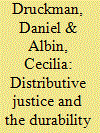| Srl | Item |
| 1 |
ID:
105643


|
|
|
|
|
| Publication |
2011.
|
| Summary/Abstract |
This study explores the relationship between principles of distributive justice (DJ) and the durability of negotiated agreements. Sixteen peace agreements negotiated during the early 1990s were coded for the centrality of each of four principles of DJ - equality, proportionality, compensation, and need - to the core terms of the agreement. The agreements were also assessed on scales of implementation and durability over a five-year period. Another variable included in the analysis was the difficulty of the conflict environment. These data were used to evaluate three sets of hypotheses: the relationship between DJ and durability, the role of the conflict environment, and types of DJ principles. The results obtained from both statistical and focused-comparison analyses indicate that DJ moderates the relationship between conflict environments and outcomes: when principles of justice are central to an agreement, the negative effects of difficult conflict environments are reduced; when principles are not central, the negative effects of difficulty are heightened. These relationships are accounted for primarily by one of the four DJ principles - equality. Implications of these findings are discussed along with a number of ideas for further research.
|
|
|
|
|
|
|
|
|
|
|
|
|
|
|
|
| 2 |
ID:
168778


|
|
|
|
|
| Summary/Abstract |
This article presents methodologies towards a multilingual literary history of Sri Lanka in the twentieth century by examining multilingual encounters or cultures through places, people, and institutions. Massey's concept of plural space underpins the study and gives rise to various strategies to build a multilingual literary history. The guiding research questions are: How do we construct multilingual literary histories in the context of language-based conflict? What can conflict environments teach us about approaches to multilingual literary histories and spheres? In addition to discovering future directions for intra-national comparative literary studies and documenting multilingual cultures and sites, I also focus on the changing geography of multilingualism in the twentieth century. As ideological separation of language spheres turned to real-world segregation through a series of policy shifts and institutional changes, we see that the pursuit of multilingual research takes us from organic, or naturally occurring, sites of multilingualism to orchestrated, or purposefully created, sites. Orchestrated sites work to counterbalance the decreasing opportunity for organic multilingual encounters in the context of ethnolinguistic conflict.
|
|
|
|
|
|
|
|
|
|
|
|
|
|
|
|